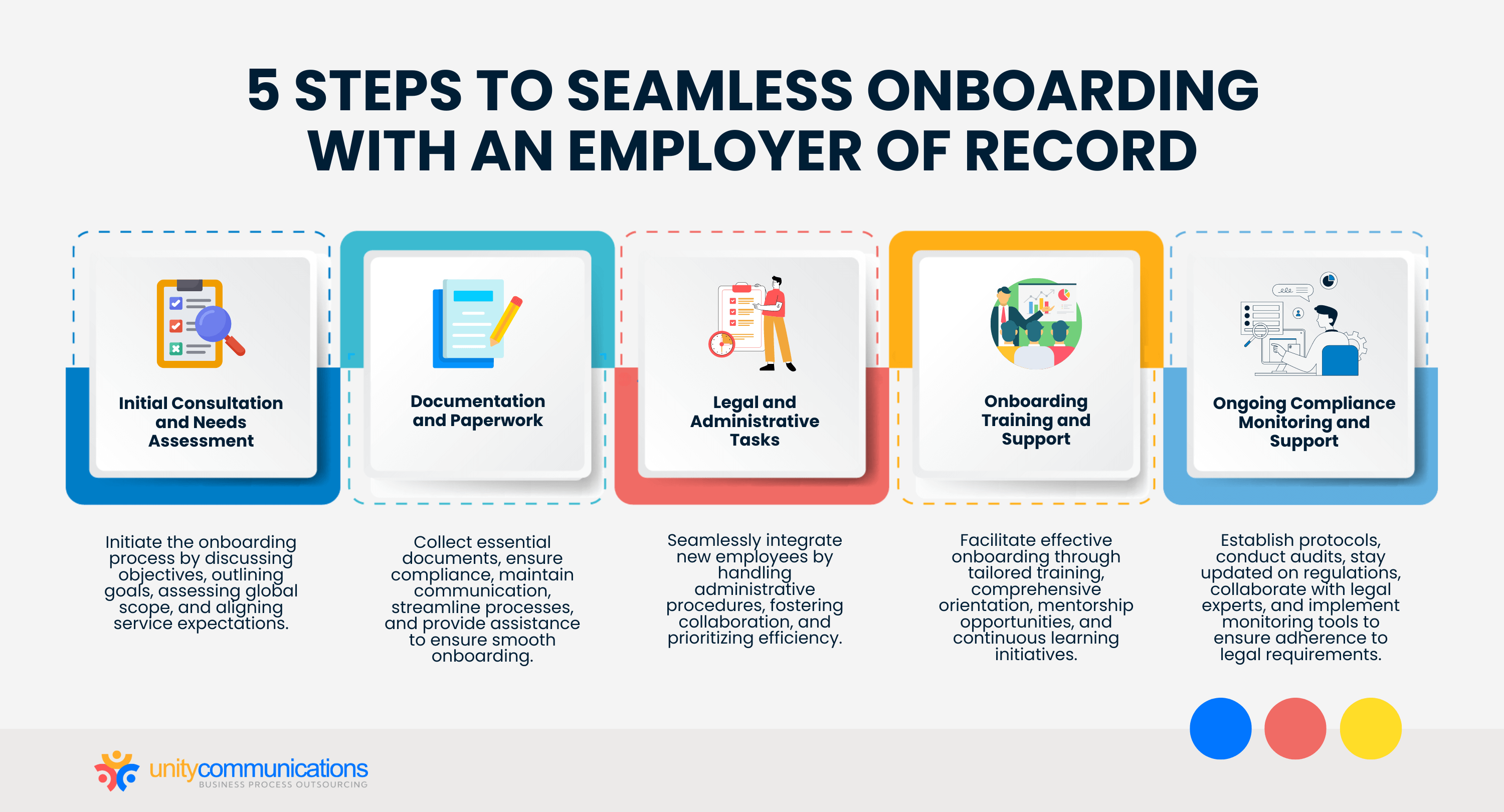IN THIS ARTICLE
Table of Contents
Expanding an enterprise’s global workforce is an exciting venture. By accessing qualified and competent third-party professionals at affordable costs, an organization opens up opportunities for development and diversity.
However, understanding the complexities of foreign employment, payroll, and compliance can be challenging.
This is where employer of record (EOR) services come into play. The EOR service provider acts as a partner, shouldering legal and personnel responsibilities for the hiring company.
Stay on this page to discover the benefits of EOR and how to properly onboard with an employer of record.
Understanding Employer of Record Services

EOR services provide firms with an effective solution to growing their global presence without setting up legal firms in other countries. Companies using EOR receive access to a network of professionals familiar with international job rules and regulations. Some of their services include benefits management, human resource (HR) compliance, payroll processing, and tax withholding.
The Benefits of Using EOR Services
EOR services present several advantages for organizations seeking to expand their reach. Consider the following benefits:
- Effortless expansion. EOR services enable companies to extend their global footprint without establishing legal companies in foreign jurisdictions. By acting as the legal employer of record, providers facilitate seamless international hiring and compliance with local labor laws and regulations.
- Guaranteed compliance. Following international labor policies and regulations can be daunting, tedious, and complex for businesses tapping into new markets. EOR providers specialize in navigating regulatory requirements, including employment contracts, and mitigating compliance risks for the hiring organization.
- Streamlined administrative processes. Managing payroll, tax filings, and other cross-border HR tasks can be time-consuming and expensive. EOR services improve administrative operations by centralizing payroll processing, standardizing procedures, and serving as a single point of contact for global workforce management.
- Scalable activities. EOR services offer scalability and flexibility to accommodate fluctuating workforce needs and business expansion. Whether deploying a single employee or extending operations to multiple countries, EOR firms provide solutions tailored to each client’s specific requirements so they can grow confidently.
- Prioritized core business. Outsourcing HR functions to an EOR provider allows companies more time and resources to focus on their strong suits. EOR vendors handle the administrative burden of international employment, allowing organizations to concentrate on strategic initiatives, innovation, and business growth.
Five Steps to Seamless Onboarding With an Employer of Record

When selecting a third-party service provider for EOR functions, evaluate its industry expertise, geographical coverage, and service capabilities. Then, the onboarding process can commence.
Some business process outsourcing (BPO) companies offer EOR services as part of their portfolio. They typically provide outsourced functions, including customer support, information technology (IT) assistance, and data entry services. However, with the rising need for global workforce management solutions, they have expanded their offerings to include EOR services.
Consider these five steps to ensure a smooth onboarding process with an employer of record:
1. Start With an Initial Consultation and Needs Assessment
Kickstart the onboarding process with an employer of record with the following tips:
- Schedule a discovery call. The process starts with scheduling a consultation. Discovery calls allow the hiring organization to discuss its objectives, challenges, and global expansion needs.
- Outline business objectives. List and define the company’s goals for international expansion, whether entering new markets or scaling up workforce capabilities.
- Assess geographical scope. Discuss the countries where you plan to hire employees with the EOR provider to ensure global coverage and compliance with local regulations.
- Evaluate service needs. Identify service requirements and communicate preferences to customize EOR services.
- Align expectations. Match requirements with EOR capabilities. Discuss service details for clarity.
2. Perform Documentation and Paperwork
Incorporate these pointers while negotiating and onboarding with the chosen employer of record:
- Compile required documents. Gather essential paperwork, such as employment contracts, tax forms, and identification records, from new hires.
- Ensure compliance. Verify that all documentation meets local regulatory requirements and is completed accurately to facilitate smooth onboarding.
- Facilitate communication. Maintain clear communication channels with the EOR firm to coordinate document collection and promptly address any questions or concerns.
- Streamline processes. Implement efficient document collection and management systems to minimize delays and streamline onboarding.
- Provide support. Offer assistance and guidance to new hires throughout the document collection process to ensure a positive onboarding experience.
3. Process Legal and Administrative Tasks
Continue the onboarding process with an employer of record using these guidelines:
- Coordinate administrative procedures. Handle payroll setup, benefits enrollment, and various administrative tasks precisely to ensure seamless integration and transition for new employees.
- Facilitate collaboration. Consistently foster transparent communication channels with the EOR company to efficiently coordinate legal and administrative processes. Promptly resolve any emerging issues to ensure uninterrupted onboarding procedures.
- Prioritize efficiency. Implementing streamlined processes and leveraging digital tools are vital strategies to reduce delays and enhance the onboarding journey for new employees. This step ensures a more streamlined transition into the organization.
4. Launch Onboarding Training and Support
To ensure effective onboarding, partner with the employer of record to implement the following recommendations:
- Tailor training materials. Customize training resources to suit new hires’ roles and responsibilities, ensuring relevance and effectiveness in their onboarding journey.
- Conduct comprehensive orientation. Provide extensive courses covering corporate policies, processes, and culture to assist new employees in feeling secure and equipped for their jobs.
- Facilitate mentorship opportunities. Partner recruits with experienced mentors to provide direction and support, expediting their transition into the business and instilling a feeling of belonging.
- Encourage continuous learning. Promote growth through accessible training and development opportunities, empowering employees for career growth and long-term success.
5. Conduct Ongoing Compliance Monitoring and Support
The final step in the onboarding process involves implementing the following strategies with the employer of record:
- Establish compliance protocols. Develop clear and comprehensive protocols outlining compliance requirements and procedures to ensure adherence to local labor laws and regulations.
- Perform regular audits and reviews. Conduct audits to identify compliance issues in HR practices, payroll, and documentation.
- Stay updated on legal changes. Remain current on labor laws, tax rules, and relevant legislation to proactively adjust policies for compliance.
- Collaborate with legal experts. Partner with legal experts for thorough compliance monitoring and support regarding international labor laws.
- Implement monitoring tools. Utilize automated monitoring tools and software systems to track compliance metrics and flag potential issues for timely resolution.
The Bottom Line

BPO companies offer varied EOR services. Some specialize in global expansion, hiring, payroll, and compliance. Others integrate EOR services into broader outsourcing solutions and offer flexible support levels.
By leveraging the expertise and infrastructure of BPO providers offering IT support outsourcing and similar functions, companies can access a wide range of services tailored to their specific requirements. EOR service providers are allies for global expansion, reducing administrative burdens and compliance risks in international hiring.
Let’s connect if you want to learn more about outsourcing and onboarding with an employer of record!





